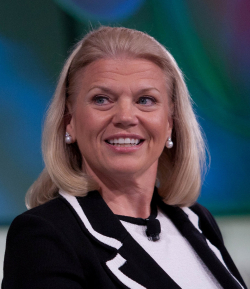 I spent my first three decades in journalism covering technology. But I started as a business journalist. In 2011 I returned to it.
I spent my first three decades in journalism covering technology. But I started as a business journalist. In 2011 I returned to it.
Since then, I’ve learned a lot and the most important lesson is this. You’ll see perpetual change.
Moore’s Law is the most important economic fact of my lifetime. It’s not just about silicon. Moore’s Law spreads in every direction, accelerating change, transforming the economy and society.
The most important change of the last decade is the Cloud. Infrastructure was traditionally financed with debt. Cloud is financed with cash flow.
A decade ago, when companies like IBM, AT&T, and GE saw that the cloud game would start at $1 billion/quarter, and that the money would have to come out of cash they gave shareholders, they said no. Facebook, which didn’t have $1 billion in quarterly cash flow at the time, said yes. Facebook is now worth more than IBM, AT&T, GE, and their accumulated debt put together.
Companies like IBM were once called “value stocks” because they grew at a regular rate, they had solid brand names, and they paid dividends. Arthur Zeikel of Merrill Lynch, who preached the value of this strategy in the 1980s, passed away recently. His strategy died with him. Warren Buffett, who also preached value for decades and said he didn’t understand technology, now holds more Apple than anything else.
I’m not here to speak ill of the dead. My point is that tech means growth, and growth is the ultimate value. The investment strategies of the past no longer work.
 As I began covering the financial beat, I started taking my own advice in my self-directed retirement account. I bought Amazon. I bought Microsoft. I bought Nvidia, Apple, and Taiwan Semiconductor. For a while I had Facebook and Qualcomm. I went from worrying about my retirement to being an actual millionaire. If you stayed with IBM, AT&T and GE you crashed and burned. (To the left is Ginni Rometty, who liquidated IBM and made herself rich doing it.) If you stayed with value stocks, you collected dividends, but your shares went nowhere.
As I began covering the financial beat, I started taking my own advice in my self-directed retirement account. I bought Amazon. I bought Microsoft. I bought Nvidia, Apple, and Taiwan Semiconductor. For a while I had Facebook and Qualcomm. I went from worrying about my retirement to being an actual millionaire. If you stayed with IBM, AT&T and GE you crashed and burned. (To the left is Ginni Rometty, who liquidated IBM and made herself rich doing it.) If you stayed with value stocks, you collected dividends, but your shares went nowhere.
It’s one thing to buy growth stocks, or tech stocks. It’s another to try and push the envelope through constant churning. That’s the mistake “tech whisperer” Cathie Wood has made with her ARK Funds. She, buys, she sells, she tries to time the market, and she gets burnt. That’s because the machines are faster than you are and, once everyone is in on a game (even tech investing), returns tend to revert to a mean.
What I’ve learned is that it’s easy to retire a millionaire. Find good tech stocks and hold them for the long term.
I’ve made mistakes. I’ve taking profits prematurely, reaching on names that were overvalued, getting in early on unproven strategies. I’m not a good trader. I’m a small investor.
But if you stay on the good side of Moore’s Law, if you keep your money in companies that grow and (in time) make money, you can be a millionaire too. Just remember that growth is the ultimate value. Growth with a profit is the ultimate test.










